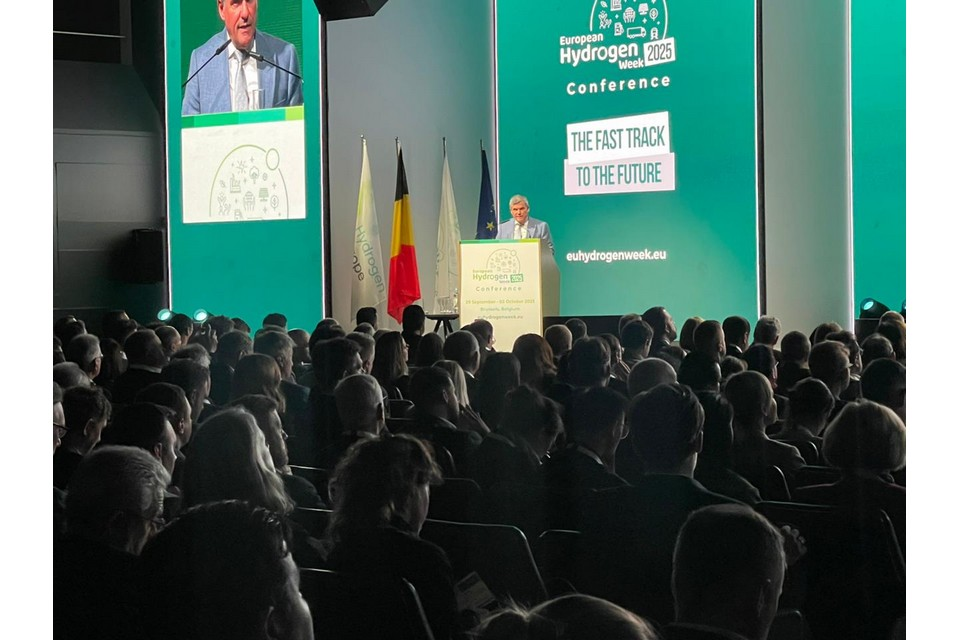Keynote speech by the Minister of Energy, Commerce and Industry of the Republic of Cyprus, Mr George Papanastasiou, at the 2025 European Hydrogen Week Conference
Firstly, I would like to thank Hydrogen Europe and, especially its Chief Executive Officer (CEO) Mr Jorgo Chatzimarkakis for inviting me to this event and giving me the opportunity to express my thoughts on the future of the hydrogen sector.
Today, we stand at a pivotal moment in the global energy transition. The urgency of climate change, the volatility of fossil fuel markets, and the need for energy security are converging into a single, undeniable truth: we must transform the way we produce, store, and use energy.
The goal of a climate-neutral Europe by 2050 is not just an aspiration; it is a necessity for the future of generations to come.
Hydrogen – particularly renewable hydrogen – is no longer a distant vision. It is considered as one of Europe’s main pillars for decarbonisation, a driver of industrial competitiveness, and a future geopolitical asset.
The European Union (EU) has recognised this through its 2020 Hydrogen Strategy, the REPowerEU plan, the Important Projects of Common European Interest (IPCEI), the creation of the European Hydrogen Bank and the establishment of the EU network of Transmission Network Operators for Hydrogen (ΕΝΝΟΗ).
Yet, the path we choose in the coming years will determine whether hydrogen becomes a cornerstone of global decarbonisation and economic renewal or a missed opportunity. The way ahead is clear – but it demands speed, scale, private investments, and coordination.
In this context, I would like to emphasise three important points.
The first is the geopolitical dimension.
Countries rich in renewable resources – from North Africa’s solar potential to the North Sea’s offshore wind – are positioning themselves as future hydrogen exporters.
Renewable and low-carbon hydrogen, alongside renewable fuels, will reshape global energy trade.
Countries with abundant renewables or cheap low-carbon electricity will become exporters; energy-importing nations will form strategic partnerships, while others will seek energy independence, giving rise to new energy alliances and promoting economic development.
This new energy geopolitical landscape will create opportunities for growth, but also risks, as global competition for market dominance intensifies.
Europe must therefore act decisively – to build strong domestic capacity and to forge fair, sustainable, and reliable hydrogen partnerships abroad.
The second point is the economic dimension.
Hydrogen can create growth opportunities. By 2050, the hydrogen economy could bring millions of jobs across engineering, manufacturing, infrastructure, and services and generate hundreds of billions of euros in annual revenue.
Given the fact that our discussions within the EU also concern enhancing our competitiveness and reviving our industries, hydrogen presents opportunities for industrial renewal, leveraging local manufacturing and building new export industries.
Hydrogen is also a domain for potential cooperation: joint projects, financing frameworks, coordinated regulations, and shared infrastructure can multiply benefits.
The third point I wish to touch upon is the challenges we face moving forward.
We must acknowledge that the road ahead is not without obstacles.
Scaling up renewable hydrogen production requires unprecedented investment, robust infrastructure, and coordinated policy frameworks across all Member States.
Technological hurdles, high initial costs, and the need for skilled workforces could slow our progress if left unaddressed.
Similarly, global competition for resources and supply chains will test our resilience and demand that Europe acts with both speed and strategic foresight.
A persistent challenge will be cost competitiveness between renewable hydrogen and its fossil fuel alternatives. Scaling up electrolysis, renewable power, and European manufacturing is essential to bring costs down and to strengthen our strategic autonomy.
Equally important is strengthening cooperation between research, innovation, and industry. Knowledge transfer and skills development are critical to unlocking hydrogen’s full potential.
At the same time, Europe must continue to provide affordable energy to its citizens, Small and Medium-sized Enterprises (SMEs), and industries. Hydrogen can play a key role here: by absorbing excess renewable energy, balancing electricity grids, and decarbonising energy-intensive sectors, thus ultimately helping to lower system costs and energy prices.
However, alignment is crucial. Investment timelines, regulatory adaptation, and infrastructure development must align to provide certainty and stability for investors and stakeholders.
We must also address regulatory fragmentation and the lack of global standards. Common definitions, certification, and trade standards are essential to enable cross-border trade and investments in the sector.
Finally, financing and risk: Large-scale hydrogen projects are capital-intensive and face market, regulatory, and offtake risks. Private capital requires predictable policy frameworks and de-risking instruments.
These challenges are real, but they are not insurmountable – provided we match our ambition with decisive action and unwavering collaboration.
Cyprus’ National Hydrogen Strategy, approved last June, focuses on the development and use of hydrogen mainly in transport. We have identified that the gradual introduction of hydrogen in the heavy transport sector is the optimal and most cost-effective way to integrate hydrogen into our energy mix.
This choice is justified by the need to ensure that any future commitment is compatible with our national specificities, realistic, feasible, and tailored to Cyprus’ needs. For example, water scarcity in Cyprus constitutes a critical factor, as the production of green hydrogen through electrolysis requires significant amounts of clean water – specifically, 9 to 15 kilograms for every kilogram of hydrogen.
Of course, we must not be discouraged. Private initiatives to promote innovative technologies through pilot programmes will continue so that we do not fall behind international technological developments.
Ladies and Gentlemen,
The promise of hydrogen is more than a technological opportunity; it is a defining choice for Europe’s future.
By acting together in confronting the challenges I have mentioned head-on – governments, industry, finance, and civil society – we can build a hydrogen economy that enhances energy security, spurs sustainable growth, and advances our shared climate goals. We can secure not only our energy independence, but also our leadership in the global transition to a sustainable economy.
The time to act is now and together we can ensure that hydrogen becomes the cornerstone of a cleaner, stronger, and more resilient Europe.
READ the latest news shaping the hydrogen market at Hydrogen Central
Keynote speech by the Minister of Energy, Commerce and Industry of the Republic of Cyprus, Mr George Papanastasiou, at the 2025 European Hydrogen Week Conference, source

